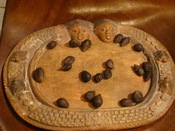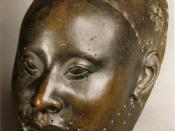Animism is the doctrine of spiritual beings. Animistic religions are often extended to include the belief that personalized supernatural beings or souls endowed with reason, intelligence, and volition inhabit ordinary objects as well as animate beings, and govern their existence. More simply, the belief is that everything is alive and everything is conscious. In other word, animistic religions believe that all living things have a soul.
The important role religion plays in African culture is the reason for the continued existence of traditional animistic religions. African animistic religion is not practiced on any particular day or in a certain building. African's incorporate their religion into each and every aspect of life. Four things make these animistic religions important: 1) belief in God, 2) belief in spirits, 3) belief in ancestors, and 4) religion is a way of life.
As in Christianity, animistic religions believe in an all powerful supernatural being.
Christians refer to this supernatural being as God. Among the many different animistic religions that you find in Africa, the Yoruba people of Nigeria also believe in a Supreme Being who they call Olorun. The Kipsigis people of Kenya also believe in one god who they call Asis or Asista. There are animistic religions in Africa that have a similar story to that of the Christian tale on the creation of earth and man. The people of Abaluhya are an example of such animistic religions. The Abaluhya's god Wele Xakaba created earth in six days and then rested on the seventh.
African religious beliefs include ideas of spirits. These spirits are a life force to African people but do not have a physical form. Spirits can be broken up into two groups. The first groups of spirits are nature spirits. Nature spirits are associated with natural objects or natural forces.


